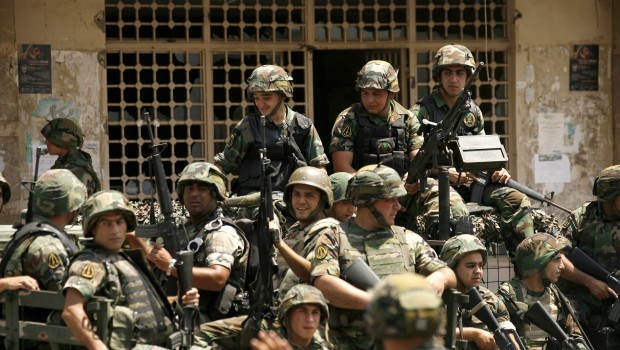In early August Lebanon celebrated “Army Day,” with an official ceremony which witnessed the graduation of officer cadets from the military academy. Military helicopters flying Lebanese flags hovered above the school overlooking Beirut. In the school’s yard, files of officers as well as symbolic military pieces and battalions paraded with the senior state officials watching from the main platform.
In appearance, the “state” was present.
Leaders of all sorts and titles were there: from the incumbent, the constant, and the resigned, to the designated, with perhaps, who knows, the country’s next president among them.
Even in his traditional speech President Michel Suleiman was like a genuine statesman preoccupied with sovereignty (which is there only in name, not in substance). The repercussions of the speech were soon felt, given its daring references to who has the exclusive right to have weapons in Lebanon, national consensus and the meaning of martyrdom.
The speech produced rapid reactions. Most significant, however, were the rockets that fell close to the presidential palace, the speech that Hassan Nasrallah gave on the occasion of the “day of Jerusalem,” and the escalating kidnappings among different sects, as well as the Syrian airstrikes on the border area near the village of Arsal. All of these incidents reflect the utter collapse of the Lebanese state.
Away from the chronic and fruitless escapist strategy that the Lebanese follow, the countdown to the destruction of Lebanon has begun. There is not a national middle ground for the Lebanese to stand on while state institutions collapse one after the other due to unhealthy tribal and factional allegiances, as well as backward, illogical and narrow-minded domestic leaders.
Although there have been countless instances of the collapse of the state, the most prominent is represented by the bizarre coexistence imposed by force of a poor “state” and a powerful “statelet.” The weapons of the state are designed to ensure no more than domestic security and are not to be used against the enemy, as the former chief of the army Michel Aoun hinted, stressing his support of Hizbollah’s right to keep its arms.
Aoun’s repeated support of Hezbollah’s right to have weapons that are more powerful than that of the army must raise questions in any respectable country. This is not to mention that weapons in Lebanon are exclusively owned by a religious party whose political and military decisions are not subject to the authority of Lebanese state, despite the fact that all citizens must enjoy equal rights, from martyrdom for the national soil, to paying taxes as well as receiving unemployment and retirement benefits.
What is more, the army, along with the judicial system, is the last bastion for the fragile legitimacy in the country, is compelled to carry out only the tasks it is selectively assigned, given the difference in the balance of power between the state and the statelet.
What the army can do in the suburbs of Sidon and the outskirts of Arsal is not possible in some “security squares,” on the pretext of tasks related to “resistance.” Therefore, statesmen of Aoun’s caliber do not care about damaging the army’s credibility and prestige when they excessively support the military operations in certain geographical and sectarian locations.
This brings us to another point which may not be interesting to the non-Lebanese, namely the crisis sparked by extending the terms of the chief of the army and the chief of staff.
A few months ago, when Major General Ashraf Rifi, the General Director of the Lebanese Internal Security Forces, reached retirement age, the March 8 Alliance which consists of the “Shi’ite duo” (Hezbollah and the Amal Movement) and their allies, objected to extending his term. Accordingly, Rifi who is affiliated with the Future Movement, was forced into retirement.
However, as the Maronite chief of the army Jean Kahwaji and the Druze chief of staff Walid Salman approached retirement, everybody was confused and called for the extension of the leaders’ terms. While the “Shi’ite duo” supported the extension, Aoun was the only one who opposed it.
To all appearances, Aoun’s opposition appears to be normal given that he had earlier opposed extending Rifi’s term.
In principle, appointments of the heads of the army, internal security, general security and state security are subject to broad understandings that are based on nominations made by the leaders of the country’s sects and the approval of the other sides. However, the fact that only one sectarian organization has the right to have arms in Lebanon changed the rules of the game. Thus, the Future Movement, which enjoys Sunni majority representation in the parliament, has become unable to impose its favorite candidate or, as in Rifi’s case, defend him or extend his term. The same applies to Walid Jumblatt, whose favorite candidate for chief of staff has been vetoed on several occasions.
As for Kahwaji, he was nominated by Aoun, supported by the “Shi’ite duo” and approved by the president. At the time, the appointment of Kahwaji was in the interest of Aoun and other Christian factions. However, the situation is different now given the deadlocked political process in Lebanon, embodied by the inability to form a government. Thus, the renewal of Kahwaji’s term may mean that he is the favorite candidate for the presidency, similar to what happened with Michel Suleiman a few years ago.
This possibility is utterly rejected by Aoun, who nominates three presidential candidates, namely himself (despite the fact he will be 80 soon) as well as his two sons-in-law Cahmel Roukaz, chief of commandos, and minister Gebran Bassil.
Aoun still covets the presidency. As for Hezbollah, it has a much bigger project which, after the party’s involvement in the Syrian crisis, aims at spreading Shi’ism in certain areas in Syria in a bid to divide the country.
